 |
Women resting in the tent put up by Jan Nithi Abhyan (JNA) and Akal Sangharsh Samithi (ASS) during a 10 day public meeting in the fall of 2003. The JNA was a campaign for a peoples’ manifesto launched by civil society groups from across Rajasthan including the MKSS in 2003 prior to the state assembly elections. The ASS campaign demanded that the state government improve its policies and protect the lives of the rural workers and farmers during the drought that had hit Rajasthan in the 4 years preceding 2003. |
 |
Participants discussing campaign issues during a meeting of the Jan Nithi Abhyan. In the centre Shanker Singh (with spectacles) a founder member of the MKSS makes a point. |
 |
People observing the proceedings of the public meeting called for by Jan Nithi Abhyan. The campaign attracted many participants and observers in its meeting site just outside the state assembly in Jaipur. |
 |
A television cameraman aims at the audience during the Jan Nithi Abhyan meeting. Shanker Singh of the MKSS makes a point at the mike. |
 |
Volunteers cooking rotis (bread) at the meeting site of the Jan Nithi Abhyan in Jaipur. Such group kitchens are a familiar sight in MKSS campaigns where people from distant villages travel to cities to demonstrate for long periods and stay away from their homes for several weeks at a stretch. The MKSS obtains donations of grains from its rural supporters which are then used to cook food in these community kitchens during this period. |
 |
Aruna Roy (standing) a founding member of the MKSS addresses the public meeting as part of the Jan Nithi Abhyan in Jaipur. In the background banners of the Akal Sangharsh Samithi (Anti Drought Struggle Campaign), Right to Work Campaign and the Right to Information campaign are displayed. |
 |
Women members of the MKSS singing a campaign song during a public meeting. |
 |
Shanker Singh leads a MKSS team through a campaign song at a public meeting. The MKSS uses a variety of cultural communication media to address people. Such songs are very popular with the people especially children. |
 |
Aruna Roy of the MKSS making a point at the Jan Nithi Abhyan meeting. The campaign was launched as an attempt by civil society groups in Rajasthan to counter divisive politics indulged in by political parties and to encourage a discussion on democratic rights and livelihood issues before the state assembly elections. |
 |
Aruna Roy and Lal Singh (red turban) both founder members of the MKSS during the public meeting called for by the Jan Nithi Abhyan. |
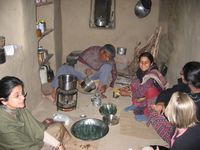 |
View of the MKSS kitchen. MKSS membership is drawn almost exclusively from local villagers and the lifestyle of MKSS workers is reflective of this fact. |
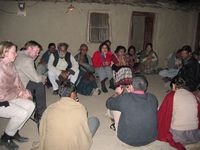 |
The MKSS holding discussions with members of the International Transparency Task Force in the courtyard of their residence in Devdungri village. |
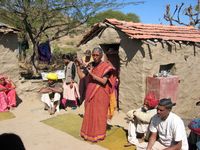 |
Aruna Roy makes a point while Dau Singh, Narayan Singh (right) listen intently outside the MKSS residence. Narayan Singh is one of two MKSS workers who was elected as Sarpanch (village head) in the Panchayat (village) elections in 2000. |
 |
Outside the MKSS residence in Devdungri village. Nikhil Dey (far left) a founding member of the MKSS looks on as others help in cutting vegetables and washing dishes outside the MKSS kitchen. |
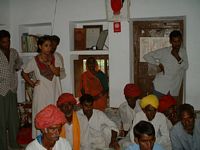 |
MKSS members viewing a film in the office located in Devdungri village in Central Rajasthan. The office has several local visitors daily who come to discuss problems that they face and ask for suggestions and help from the MKSS. |
 |
The MKSS is located in the village Devdungri named after God’s (Dev) Hill (Dungri). A temple dedicated to the local deity sits atop the hill. |
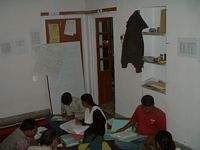 |
Scene from the Rajasthan Election Watch (REW) head office in Jaipur. Volunteers screen candidate disclosure forms which were collated into a database for use in the Election Watch campaign. The REW campaign was launched by a network of civil society groups including the MKSS to publicize candidate (for office) profiles to the voters prior to the assembly elections in 2003. |
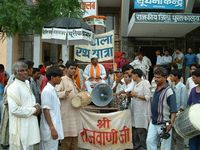 |
The Ghotala Rath Yatra in the streets of Rajasthan. This ‘chariot of scam’ is a playact on politicians and their campaigning methods which includes making false promises to the people, justifying corruption, using divisive politics etc. The procession is taken around cities and villages to attract peoples’ attention to the sorry plight of electoral processes in India. |
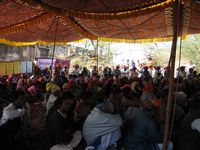 |
A public hearing in the village of Jawaja. The hearing was attended by villagers from the surrounding area, public officials from the district and state level and the media. Discussions in the meeting were held on the health sector in the state and especially the problems in the management and work of the local community hospitals. |
 |
Villagers in Jawaja walk past the information charts put up in the site of the public hearing on health sector issues. This meeting was organized by the MKSS to highlight the problems with the health department and particularly the functioning of the local public hospitals. |
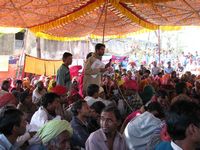 |
MKSS worker Dilip Singh handling the micro phone in the middle of a section of the audience during the public hearing in Jawaja. People discussed issues ranging from lack of medicines, poor treatment by doctors and lack of proper and adequate infrastructure in the hospital etc. |
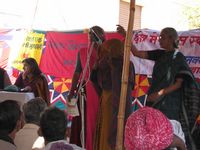 |
Aruna Roy of the MKSS makes a point during the health public hearing in the Jawaja village held in January 2004. |
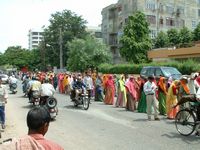 |
Jan Nithi Abhyan participants march along the roads of Jaipur, in a demonstration. |
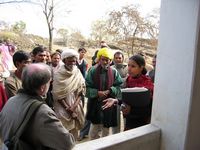 |
MKSS worker Sowmya explains some issues of corruption and mismanagement to the International Transparency Task Force visitors during their visit to Janawad village in Rajasthan. Janawad became famous for a large financial scam in the village development expenses that was exposed by the MKSS during a public hearing in that village in 2001. |
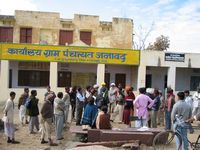 |
The International Transparency Task Force members being taken around the Janawad village administrative head quarters. Corruption in the village included several ghost (non existent) development works and huge sums of money being usurped by a corrupt nexus of local politicians and bureaucrats. |
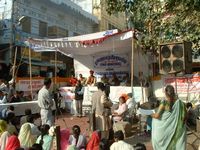 |
Members of the audience pose questions to the candidates during the ‘meet the candidate session’ organized by the MKSS in Rajasamand district in central Rajasthan. The meeting held prior to the state assembly elections was a big success even though candidates from some of the major parties did not turn up. |
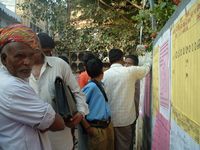 |
Voters in Rajasamand reading charts showing candidate profiles during the ‘meet the candidate session’ organized by the MKSS. Charts show details of various assets owned by the candidates, their criminal and educational records and the amount they owed as dues to public departments. |
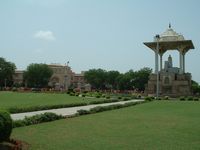 |
The Jan Nithi Abhyan protestors walk past Statue Circle in the city Jaipur on their way to demonstrate in front of the Rajasthan State assembly. Statue circle is a famous landmark in Jaipur and is located just outside the state assembly. |
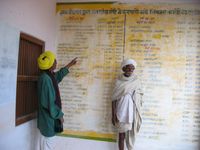 |
Chamnaram of the MKSS points to the public development expenditure disclosure board in the village of Janawad which had been painted over by the district officials prior to the assembly elections in Rajasthan in 2003. Such ‘erasure’ of government disclosures was done by over enthusiastic government officials who misinterpreted the Election Commission of India’s directive to them to prevent the government from advertising their ‘achievements’ using public funds. |
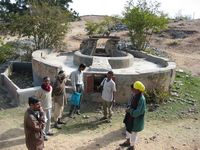 |
Members of the MKSS visit a public well in Janawad village from which funds had been misappropriated. The MKSS public hearings have led to discovery of numerous such cases where public works are used as a cover for financial scams and fraudulent works. |
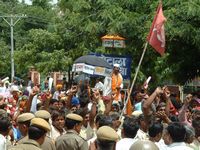 |
The Ghotala Rath Yatra near the State assembly in Jaipur. As the procession nears the state assembly the police move in to prevent demonstrators from getting closer to the assembly premises. |
 |
Demonstrators of the Right to Work (RTW) campaign surrounded by police in front of the Rajasthan State Assembly in Jaipur. In the centre the popular MKSS puppet is used to make a campaign point. The RTW campaign demanded that the state legislature pass a law providing for a rural employment guarantee act in the state. |
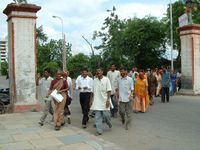 |
Aruna Roy, Nikhil Dey and Shanker Singh-founder members of the MKSS walk alongside the Jan Nithi Abhyan demonstrators in Jaipur. |
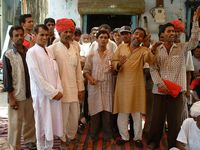 |
The MKSS team singing a campaign song during the Jan Nithi Abhyan. |
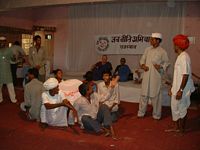 |
Members of the MKSS in the city of Udaipur performing a play as part of the Jan Nithi Abhyan. The play portrays the cynical campaigning style of politicians as they make false promises to the people but refuse to focus on their demand for Employment Guarantee legislation. |
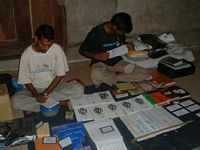 |
MKSS pamphlets, books with MKSS literature being sold outside a meeting room. |
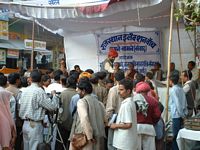 |
Section of the audience participating in the ‘meet the candidate session’ in Rajasamand. On the dias Aruna Roy of the MKSS sits along side the invited candidates. |
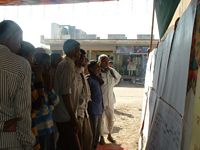 |
Voters in Rajasamand looking at candidate profiles during the ‘meet the candidate session’. |
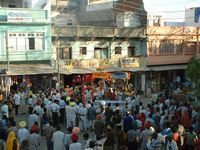 |
The Ghotala Rath ‘politician’ addresses people gathered around exhorting them vote for him in spite of his well publicized corruption. |
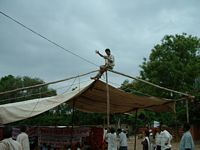 |
MKSS member Khimaram attempts to put up the tent during the Jan Nithi Abhyan meeting in Jaipur. |
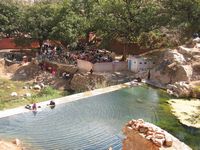 |
View of public hearing in Kelwara village organized by the MKSS on food security issues. The discussion revolved on the denial of food entitlements by the privately owned Public Distribution System centers, the poor impact of the mid day meal scheme for school children, welfare schemes taken up by the state government for villagers etc. |
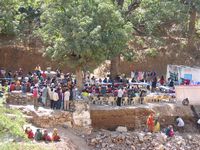 |
Participants at the public hearing on food security issues in Kelwara village in January 2004. The meeting included several senior district officials, local political representatives, media and large number of residents of the area. |
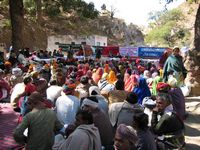 |
Nikhil Dey of the MKSS makes a point during the food security public hearing in Kelwara village. |
 |
Shanker Singh of the MKSS addresses the audience during the Kelwara public hearing. |
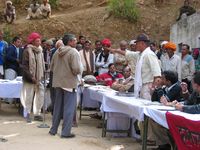 |
The Kelwara public hearing saw some heated discussions with the local elected representatives trying to discredit complaints made by people. |
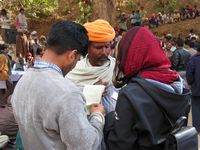 |
A villager shows a copy of his ration card where false entries were made by the food distribution centre owner thereby denying him his legitimate entitlements. |
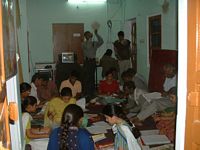 |
Volunteers of Rajasthan Election Watch screening political candidate profiles in the campaign office in Jaipur prior to assembly elections. Volunteers included college professors, students, lawyers, retired bureaucrats, non governmental organization staff, retired judges, rural and urban activists. |
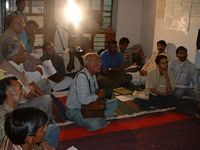 |
Media participating in a press briefing called for by the Rajasthan Election Watch in Jaipur. Press briefings included ranking of candidates and political parties on their wealth, criminal records, educational background etc. |
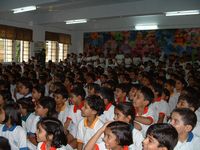 |
Children in a school observe proceedings of a meeting organized by the MKSS. This meeting was organized by SPICMACAY a non governmental organization working to promote Indian culture among youth. |
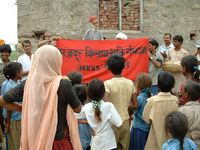 |
(Moofat) or the puppet used by the MKSS during a public meeting in a village. The puppet is especially popular among children and is used as a medium of conveying campaign messages. |
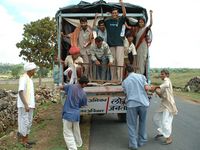 |
Members of the truck yatra (tour) coming out of the truck during a break. Around 25-30 activists traveled on the back of a truck to hundreds of towns and villages around Rajasthan in 4 phases in the period before the assembly elections in 2003 as part of the Jan Nithi Abhyan. |
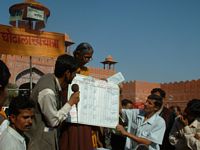 |
Charts with candidate profiles being shown at a public meeting as part of the Walk for Democracy organized by Rajasthan Election Watch. |
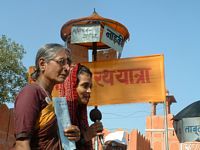 |
Arundhati Roy (famous Indian author) and Aruna Roy (founder member of the MKSS) addressing a meeting during the Walk for Democracy organized by the Rajasthan Election Watch. Participants walked along 5 assembly constituencies in the capital city of Jaipur holding public meetings in several corners of the city where voters were encouraged not to vote for candidates with corrupt and criminal backgrounds. |
|
|
The Politician in the Ghotala Rath is questioned by a voter on his alleged corrupt practices. The rath was so popular in several villages and cities that people ordered ‘official’ campaign proceedings to stop so that they could see and hear the ghotala rath proceedings. |